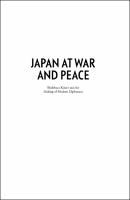Japan at War and Peace
Shidehara Kijūrō and the Making of Modern Diplomacy
Abstract
The question of how to maintain the continuity of diplomacy while developing democracy without military intervention is an old and new issue. The challenge can be described as a dilemma between democracy and diplomatic coherence. This dilemma is not unique to the twenty-first century; it has been a constant challenge to the development of democracy. In non-Western countries, democratisation originated in the nineteenth century and has had many successes and failures. After the Russo-Japanese War, political parties began to take power in Japan. The best embodiment of diplomacy in Japan's emerging democracy—the development of parliamentary democracy and mass-based democracy—is Shidehara Kijūrō (1872–1951), who served as foreign minister from 1924 to 1927 and from 1929 to 1931, and was prime minister from 1945 to 1946. As a diplomat from the Ministry of Foreign Affairs, Shidehara had long grappled with the issue of how to ensure diplomatic coherence in modern Japan, which was becoming increasingly democratic. Although Shidehara succeeded to some extent in promoting diplomacy in cooperation with the US and the UK under party politics, the rise of the military after the Manchurian Incident forced him to retire for a period. However, after the Pacific War, Shidehara became prime minister of the US-occupied Japan and attempted to restore cooperative diplomacy under party politics. Shidehara came to the conclusion that the way to achieve both democracy and diplomatic coherence was through nonpartisan diplomacy towards peace. This book examines the tension between diplomacy and democracy, focusing on Shidehara’s life and exploring modern Japan’s footsteps. Shidehara was undoubtedly one of Japan’s most important diplomatic figures.
Keywords
constitution; War; diplomacy; Prime Minister; JapanDOI
10.22459/JWP.2021ISBN
9781760464974, 9781760464967, 9781760464974Publisher
ANU PressPublisher website
https://press.anu.edu.au/Publication date and place
Canberra, 2021Imprint
ANU PressClassification
Asian history
History and Archaeology
Later 20th century c 1950 to c 1999
Military history
International relations
Diplomacy


 Download
Download